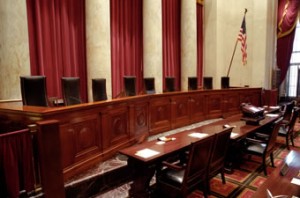Bilski
I wrote previously about my uneasiness with the United States Supreme Court’s apparent unfamiliarity with current technology. In re Bilski is a case which involves the patentability of various methods of doing  business, and how closely the methods must be connected with tangible technologies and/or outputs to be patentable. During oral arguments in In re Bilski, United States Supreme Court Chief Justice Roberts questioned one of the attorneys on the written brief. The Chief Justice analogized a software program being executed on a computer to a typewriter typing out words on a piece of paper. The Chief Justice went on to ask “if you punched in in [sic] your search station, you know, give me all the bakers in Washington, that would make it patentable?” Typewriters? Search stations? It was not just the Chief Justice who appeared unaware of how software and the internet work. None of the Supreme Court Justices in the case appeared to possess a familiarity with the workings of modern technology.
business, and how closely the methods must be connected with tangible technologies and/or outputs to be patentable. During oral arguments in In re Bilski, United States Supreme Court Chief Justice Roberts questioned one of the attorneys on the written brief. The Chief Justice analogized a software program being executed on a computer to a typewriter typing out words on a piece of paper. The Chief Justice went on to ask “if you punched in in [sic] your search station, you know, give me all the bakers in Washington, that would make it patentable?” Typewriters? Search stations? It was not just the Chief Justice who appeared unaware of how software and the internet work. None of the Supreme Court Justices in the case appeared to possess a familiarity with the workings of modern technology.
City of Ontario v. Quon
Yesterday, the Supreme Court heard oral arguments in City of Ontario v. Quon, a case involving a California police department reading private text messages from the pager of one of the department’s employees. Sounds straightforward enough. Halfway into the oral argument however, Chief Justice Roberts queried what happens if the employee was sending a message from his pager when he received a call, “do they get a busy signal?” Justice Kennedy asked “Does it say: ‘Your call is important to us, and we will get back to you?'” The concept of text messages traveling through a service provider appeared to take more than one Justice by surprise. The Chief Justice admitted he believed that once “you push a button; it goes right to the other thing” without passing through a service provider. When Attorney Dammeir pointed out that in today’s society it is reasonable to assume texts travel through a service provider, rather than directly from one device to another, Justice Scalia admitted, “Yeah, I didn’t know.” Justice Scalia also questioned whether the employee could print out hard copies of “these spicy little conversations and send them to his buddies?”
The Law of Technology
Laws governing technology are expanding at an ever-increasing rate. As soon as a new technology arises, governing legislation follows closely behind. It is up to the courts to interpret these laws in a fair and predictable manner. Predictability of the laws governing the creation, protection, transfer and use of technology are critical to the smooth flow of business in our society. Failure to accurately and fairly administer laws relating to technology costs industries billions of dollars and paves the way for the unscrupulous to capitalize on perceived weaknesses in the law.
President Obama’s Pick
With billions of dollars hanging in the balance in cases like In re Bilski, it is imperative that courts fully inform themselves about the technologies at issue and the ramifications various judicial rulings will have not only on the specific technology at issue in the case, but on technology as a whole. Uncertainty in this decision-making process or the appearance of a less than fully informed judiciary encourages untoward actions in the industry and discourages desirable conduct. The announcement of Justice John Paul Stevens’ retirement provides President Obama the perfect opportunity to add certainty to this decision-making process, by selecting a technological savvy Justice to the Court. Selecting a technophile would not only provide the Court with much needed expertise, but would allay concerns, however unfounded, that future decisions of the Court might be decided on Twentieth Century notions of Twenty-First Century technology.
Here is the transcript of the oral argument in City of Ontario v. Quon.





Recent Comments